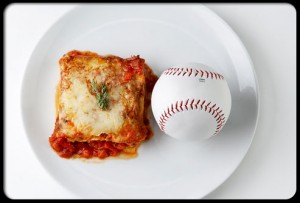The foundation for where 99.999% of our energy comes from the basic foods we put into our body. This energy that we take from these foods are classified in three different categories called Macronutrients. You may know them as carbohydrates, proteins, and fats.
our body. This energy that we take from these foods are classified in three different categories called Macronutrients. You may know them as carbohydrates, proteins, and fats.
These three elements are what give you the energy to chase down a fly ball, pitch 6 innings, or beat out an infield single.
Carbohydrates are essentially the least efficient form of biological energy but serves as the most important factor in providing the needed energy.
For example, while sprinting, carbohydrates are the only capable source of energy that is able to provide energy in a quick and efficient way. In basically every physical activity, carbohydrates are the first stored energy to be used to produce energy, and are the quickest to be depleted.
So the key point here is Carbohydrates are good, and essential if you want to get the optimal amount of energy before a game and avoid your body breaking down after a game and over the course of a long season.
A typical human being has roughly between 1,500 and 2,000 calories of reserved carbohydrates. Going more than 6 hours without eating, such as sleeping or lazy eating habits, can dramatically lower these carbohydrate stores.
So making sure we keep these levels of carbs at a certain level is as important as staying hydrated and will basically aid in keeping our strength, quickness, mental aptitude, and overall performance.
Here are a few examples of recommended carb levels.
A baseball player that weighs 170 pounds can keep roughly around 1,000-1,300 grams of reserved carb energy or between 4,000-5,000 calories of carbs.
So with this in mind, it is actually possible to make muscle gains through the course of a season.
So you may be wondering what kinds of carbs are essential for pre-game and post-game meals.
Glucose and Fructose
This is the most fundamental form of carbohydrate. Fructose can be found in fruit food groups and is turned into glucose. The brain for example uses glucose directly as a source of energy.
Sucrose
The combination of glucose and fructose. Milk, table sugars (snickers bar), are what is called simple sugars because they are quickly absorbed and converted into energy quickly. The thing with sucrose is that the energy burns like gas. Our intention is to find a healthy balance of energy sources that burn like a mixture of gas and oil. Not to fast, but more importantly not to slow.
I recommend simple sugars as a source of energy after a game to help replenish carb energy stores. Gatorade, Power aid, Snickers bar, etc. But not before or during a game.
Starch and Fibers
This form of carbs is also known as complex-carbs. Pastas, bread, sweet potatoes, these forms of carbs break down slow but provide a steady source of fuel. Complex carbs are the ideal pre-game meal for essential energy.
What about Protein?
The issues with protein is that a lot of baseball players assume that in order to prevent muscle loss during a baseball season, they have to increase their intake of protein. This couldn’t be farther from the truth.
Though it may be true that proteins are the building blocks for every physical aspect about us, when it comes to keeping the muscle gains during a baseball season, it is the carb intake that allows us to do this.
Proteins are essential for muscle-building, but it’s not necessary to over do the intake.
According to the RDA, the typical male needs only around 60 grams of protein a day.
Of course if you’re performing heavy lifting and power lifting I would recommend doubling the protein intake.
So what should you eat?
The problem with most baseball players diet is they either overdo the input of fats in their diet, giving them a slow burning source of energy causing them to feel sluggish, or they do not intake enough essential and complex carbs, causing the same symptoms. So the goal for a baseball player is to have a little more than half of their pre-game meal be carbohydrates focusing on foods like fruits, whole grain, whole wheat, high-fiber grains and cereals. I also recommend a little less than 30% consist of fats.
What fats you do eat should be good fats such as mono and poly saturated fats, omega three acids that can be found in fish such as tuna, salmon, nuts, (cold pressed) olive oils.
Between 10% – 20% of your meal should be protein that can be found in lean meats, milk, meal replacements, and poultries.
1 Response to "Baseball nutriton"
https://artofbaseball.net/2011/01/22/domingo-ayala-v-s-kenny-powers-post-and-win-a-free-domingo-t-shirt/